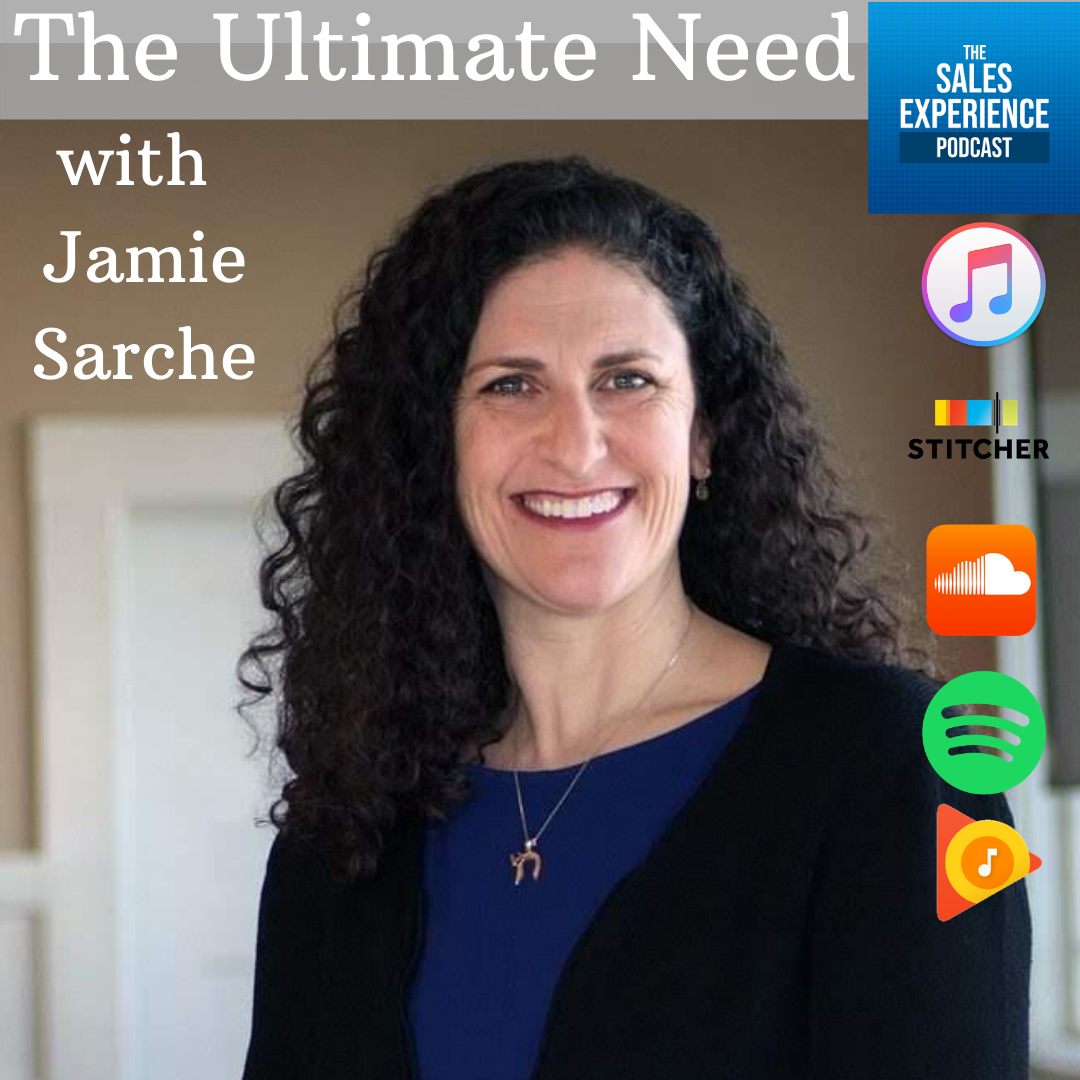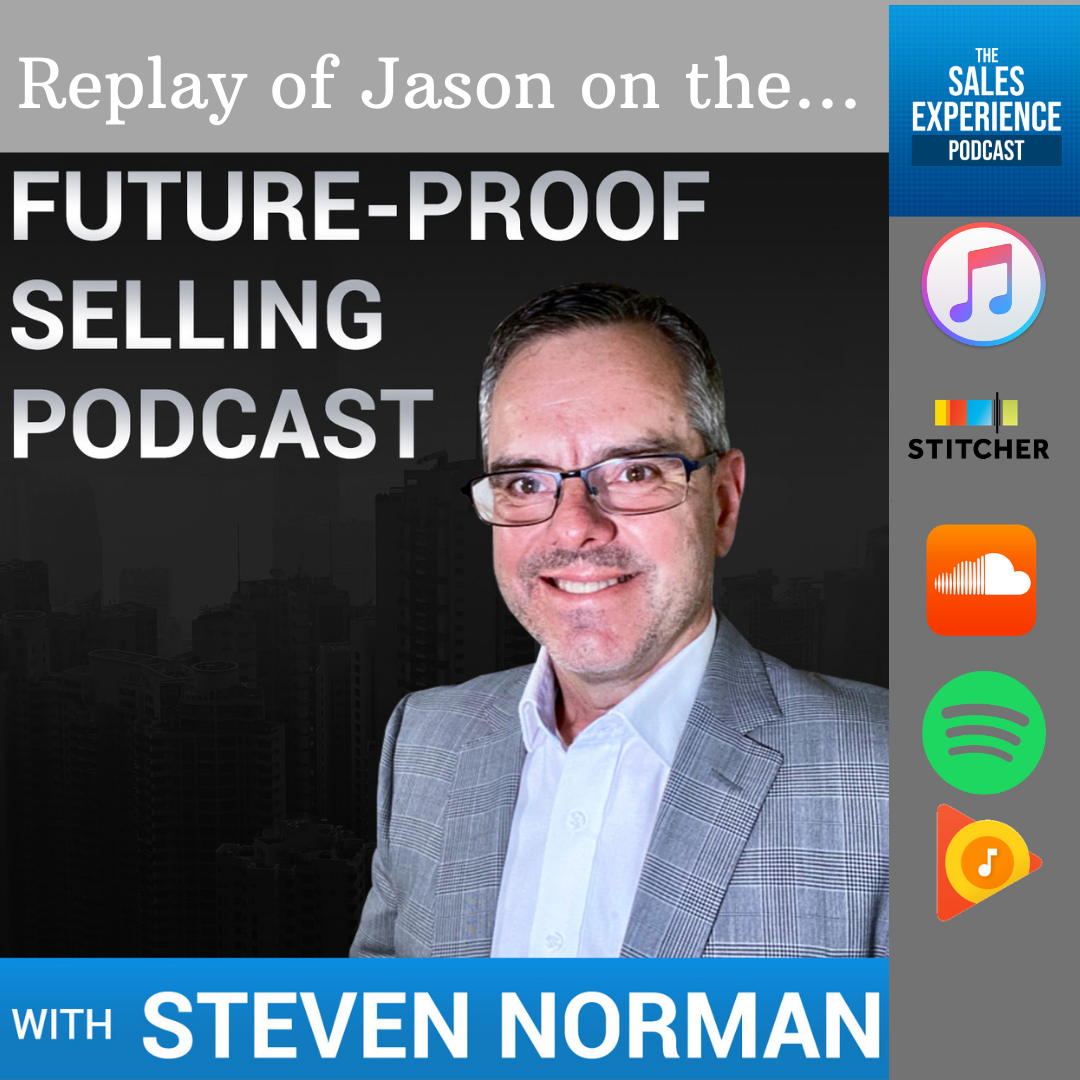Episode Transcript
Jason: I am so glad that you're here. I'm so glad that you're taking the time to hopefully up level your sales career or your sales team by listening to podcasts like this. Hopefully you've subscribed. If not, make sure to subscribe. And if you like this, leave a rating and a review. And in this episode, I am going to address some sales related questions to try to help everybody in sales do more, be more and sell more with their career and achieve their goals.
Now, let's go ahead and jump into this episode. Based on my experience with a whole lot of salespeople, there's one part in the conversation. That makes most people very nervous. Now, imagine this scenario. You're getting down to the point where you're about to talk about price. Yes, there's a price, there's a fee, maybe even a contract involved with your product or service.
And most people start getting nervous. They're worried about the prospect saying no. Or getting upset, or being confrontational, or raising objections and issues. I know that I know that everybody in sales has had an experience where they were excited about a deal, where the prospects seemed like the perfect fit, it was a slam dunk, you might as well put it on the board, ring that bell, high fives everywhere, cause this deal is done, then price comes up, and then it blows up in their face, we have all had that, I've had that, I've seen it more times than I can count, where it seems like it's a done deal, price comes up, And then the prospect freaks out, and then the whole deal falls apart.
And what happens for salespeople is that it's like touching a hot stove. That failed sale is now burned into your mind as something to avoid at all cost. And it actually causes this nervous twitch. If you were ever hit by a wooden spoon as a kid. Or buy the belt, and then your parent raises a wooden spoon in a certain way, and you just flinch because you know what's coming, because it hurt, it sucked last time, right?
And so same thing happens with this, where it happens to everybody at price, it can happen to some people at other points of the transaction, where literally You go into asking about price, or talking about price, or talking about fees, and there's that hesitation because you just don't want to get hit again by that spoon or touch that hot stove.
And the problem is that when this happens, it actually introduces this level of hesitation that you have into the conversation, which will then potentially plant that seed subconsciously with your prospects, and it's I've said this before, animals can sense fear, dogs can sense fear. I had a friend growing up, they did not have dogs as a family.
He did not like dogs. We always had dogs and some bigger dogs like huskies and shepherds. And so he would freak out, he didn't like it, and they could sense it, so they would freak out. And it was only with him, it wasn't with anybody else. And so your prospects can actually sense that as well, and the problem becomes, is that it becomes a self fulfilling prophecy in a loop.
The challenge is that you go into it hesitating because the last time somebody smacked you in the head over price and you lost the deal. Then you go into the next conversation, hesitating and asking in a shy kind of way, or there's some bit in your tone. That I can usually detect when I listen to somebody.
I can tell what probably happened to them in the past. And then the problem is that person picks up on it, senses the fear, and then it just keeps feeding on itself. You just have that issue. And so that's one of the problems, one of the things to keep in mind, that's not even what I want to talk about today in particular, but that's something to always keep in mind.
How are you showing up in those conversations? How are you presenting yourself? Are you confident that you know what you're selling and the value is there relative to the price and the fees, or are you hesitating and doubting for some reason? And I would really always recommend getting some kind of coaching management leadership training, something where relative to what that issue is.
You get some help from the outside trying to redirect your mindset and your conversation in an appropriate way. Now, let's talk about the other thing that I see a lot when it comes to price is that so many times I see salespeople prejudge a prospect's ability to pay. Have you ever thought, Oh, they won't be able to afford this.
It's too much money for them or something like Oh, they will think that it's too expensive. I can't ask them to pay that much. And usually that's feeding from some kind of insecurity. Or like I said in the previous bit, where something negative happened, you couldn't close the deal because of price or some kind of issue like that.
And the next thing you know, you lose that deal. And so you're bringing that baggage with you to the next conversation. Or maybe sometimes what happens too is that prospects, they are dropping hints during the conversation about limited money, limited funds, not wanting to pay for fees, not wanting to pay this and that.
And so you're just prejudging, you're picking up on those things. Or you're prejudging that, wow, this person isn't going to want to afford it. The price is too high. And all of those things come into play. And again, the next thing you know, they don't want to buy. They're not interested in it. They don't see the value.
And the biggest challenge with this is that all of this with the prejudging side is coming usually before the prospect has even had any kind of say. In the discussion, the key with this, and here's the punchline. The final answer is don't prejudge your prospects ability to pay. Let me repeat that. Do not prejudge your prospects ability to pay or afford what it is that you sell.
The one thing, again, and I'm going to say it because it's so important, both of these issues where people hesitate talking about price or prejudge have one thing in common, and that's a lack of confidence by the salesperson. It could be a lack of confidence in the product, the service, their company. Or themselves, right?
So it's all of that. It could be any of those things. And again, it's either based on previous failures or tricks our minds play on us to keep us scared, keep us in our safety zone, like it doesn't want us to get hurt. So it'd rather keep us in our comfort zone instead of pushing ourselves and getting hit with confrontation or anything that might hit our ego.
And this real issue with the lack of confidence comes down to usually you haven't identified the value of what you're selling for your prospect. Now in the previous episode, I talked a lot about what's in it for them. What do they want? They want to buy holes, not drills. The problem I see is that a lot of salespeople don't understand the value of that hole, the value of that solution for them.
And if you didn't check it, if you didn't hear it, make sure to listen to that episode where I talked about drills versus holes. Because it's so important, but it's one thing to know that your prospect wants the solution that you have. It's another one to actually believe in that value and the cost of that value and what they're willing to pay for it, right?
That's another thing. And the challenge is that if you knew that the value was there and it was super clear, you would never Hesitate with asking or talking about price. For example, if I told you I would sell you a hundred dollar bill for 20 a piece, other than you thinking it was a scam and obviously getting to the point where you understood if it was a valid option.
Would you hesitate in paying 20 if I was going to turn around and give you a hundred dollars? No. And in fact, you would try to find as much money as you could to invest those 20 into a five times return. You would literally borrow anything and everything you could sell, everything you've got in order to see that opportunity through to the end.
If you're helping your customer generate 10, 000 in new business. And it costs them 2, 000 for your service, or your coaching, or your help. Would that be worth it to them? And so the issue is not whether there's actually value. It's if you believe in the value, and if you've helped them identify the value for them.
The first one is a mindset issue, right? Whether you believe in the value. And if you want to be successful in sales and selling to value, you want to shift your mindset around what you're doing. That may be doing more research about what you're actually doing to help your prospects, your customers, maybe even trust in yourself more.
If you struggle with this, again, get a coach who can guide you through that mindset shift and help you focus on the right things to learn and develop internally so that you can sell the value. Now, the second one is a sales process issue where you haven't helped the prospect identify the value for themselves.
For this, the key is to ask more questions, which I say all the time, but ask more questions, dig as deep as the prospect will let you, and then show them how their needs, wants, desires are all solved with what you're offering. Help them calculate. An ROI, which means a return on investment for what you're selling.
There is always an ROI. There's always a return on investment. Now, if you help someone generate an additional 10, 000 or a hundred thousand dollars or 1 million in revenue, or free up time with automation or live a healthy life. Or maybe even just enjoy watching movies in their new home theater setup that you sold them.
That, all of that is a return on investment, whether it's monetary or emotional or physical, mental, it doesn't matter. If you know what that is and you can clearly help them see that, should you be second guessing the cost to get them there. And if you find yourself prejudging if your prospect can afford it, you need to shift that thinking.
Do not prejudge. If you have value, the right people will see it. If you've done it in the right way, where you've asked questions, uncovered their need, help them see it, and then you can move them forward. And you shouldn't ever Hesitate and asking for the money for bringing up price, talking about fees, talking about whatever the agreement might look like, if they have seen the value and you know that you've gotten them there, thank you for listening to the sales experience podcast, find show notes, more episodes, and join our email list by going to cutter consulting group.com forward slash podcast.
![[E244] Prejudging Their Ability To Pay](https://episodes.castos.com/salesexperiencepodcast/images/TSEP-E244-Prejuding-Ability-Cover.png)


